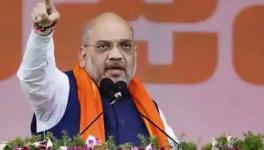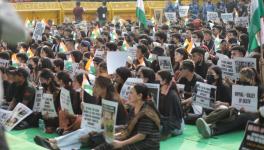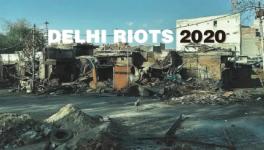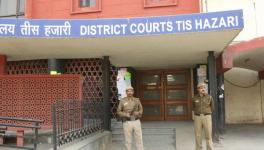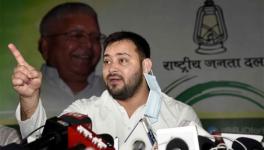Delhi Violence: Legitimising Biased and Prejudiced Governance?
Union Home Minister Amit Shah defended the role of Delhi Police in the Lok Sabha debate on Delhi violence on Wednesday. He praised the Delhi Police for stopping violence from spreading to other parts of Delhi and bringing the situation under control within 36 hours. However, in the same breath, he also claimed that it was he who sent National Security Advisor Ajit Doval to boost the morale of the Delhi Police. Although, the NSA was sent in on the fourth day of the violence.
The NSA, speaking on March 5 at the “Third Young Superintendent of Police Conference” organised by Bureau of Police Research and Development, had asked young officers to make the police a “credible and fair” force. He urged them to work for those who feel “most neglected, unprivileged, those who feel there is lack of safety and security for them and who feel that their complaint will never reach police.”
Doval’s inaugural speech, in the wake of Delhi burning for four days, was meant to push police officers to be more pro-active in enforcing laws. What he missed out was on making them aware of their constitutional responsibility to also follow the law while enforcing it. Indeed, when he spoke of enforcing laws enacted by Parliament, he missed out on a matter of utmost importance. Just because a law is enacted by Parliament does not mean that the 38% who voted for the ruling party or those 62% who did not, cease to have a voice and can have no opinion or even protest peacefully.
Democratic consensus-building emerges through contestation and compromise, inside and outside Parliament. True, protests cannot turn into anarchy, which we witnessed during the “jat agitation” in Haryana, which the Bharatiya Janata Party-ruled government did nothing to stop. Nevertheless, in the times we live in, the NSA’s words did convey a somewhat different message than the one being projected by the Union Government.
Look at Uttar Pradesh, where its police force is in clear violation of law by putting up billboards with personal details of those whom they accuse of instigating violence while protesting CAA-NRC-NPR. The UP police investigation still continues. Whether any of the persons targeted by UP police is actually made an accused is still far from clear. And until the persons publicly maligned through the billboards are charged, and the trial establishes their guilt, no claim or demand on them can be raised.
More alarmingly, the UP government, despite being chastised by the Allahabad High Court for such brazen violation of the Constitution and law, dragged its feet to comply with the Court’s order and has now challenged the order in Supreme Court. Even otherwise, UP police’s cracking down on citizen protestors, the attack on children, women and men, including the alleged killing of 19 persons, speaks of how lawless acts by the police has become the new ‘normal’ in Uttar Pradesh. And instead of “credible and fair” policing, they appear to be moving as a biased and prejudiced force.
Amit Shah’s praise for Delhi police for restoring order within 36 hours flies in the face of what residents of Delhi experienced and saw, when, for nearly 96 hours, the Capital city continued to burn. A riot-like situation can be brought under control within less than 24 hours, and if this did not happen, it is either by design or because of the collapse of the police machinery. Police call records show that out of 21,000 distress calls between February 22 and 29, no less than 13,000 were made to police in just three days after February 23, and 6,000 were made on February 26, according to a police officer quted in Hindustan Times. These calls for help went largely unattended. Even unnamed police officers from other police districts of Delhi expressed their anguish.
Apart from hapless victims making distress calls, even police officers found their colleagues in North-East police district to be unresponsive. Indeed, the same officer also pointed out that every police officer in Delhi received real-time information on the wireless. Yet, no order came to send reinforcement to the violence hit North-East Delhi.
Since the violence ended and investigations began, the police has refused to share details with the kith and kin of those they detained or arrested, so the public remains clueless about 2,647 persons picked up by the Delhi Police for their alleged role in violence. No FIRs are being recorded by the police of complaints in which people complain of police atrocity, including killing. Hospitals are not providing for MedicoLegal Cases.
The victims’ experience of the police, who either stood by or even participated in attacks during the violence at places, has been compounded by the police’s focus on the role played by peaceful citizen protestors while exonerating the perpetrators of violence. Worse, neither shame nor remorse is being shown by the Union Government which is engaging in blaming the victims.
In an unprecedented development, the NSA had to walk the streets of North-East Delhi to reassure citizens, lest a law and order issue escalated to public disorder and graduated to become an internal security headache. This ought to have sent a signal to the rank and file of the police to reach out to those most in need of help. Yet, it appears that the effort is to pin the blame on those who have suffered and lost the most.
There is no doubt that both Hindus and Muslims were affected— except that a disproportionately large number of Muslims have suffered physical and economic losses. Of the 53 killed and more than the 500 injured, the majority are Muslims although they comprise just 30% of North-East Delhi’s population. Sixteen of their places of worship were reportedly attacked, their houses and other property destroyed. Anecdotal evidence suggests that a majority of the 2,647 people picked up by the police are Muslims. So, blaming the victims and putting the onus for violence on them is just the opposite of what NSA argued for. In turn, the assurance he gave to the affected people in North-East Delhi seems to have fallen on deaf ears.
If the words of NSA do not cut much ice with the police force, which is directly under the Home Ministry, and the law enforcers’ abysmal role in failing to prevent violence from erupting is ignored, then the question that arises is: What does this mean in so far as police-citizen relationship is concerned? How far have we actually moved from the colonial police attitude which treated natives as subjects and privileged the protection of the colonial rule? Does it mean that under BJP rule, the police is fast returning to its colonial ‘avatar’, this time, treating all those who criticise the ruling BJP, let alone protest against CAA-NRC-NPR, as enemies to be put down?
It is true that a ruling party, which faces a weak opposition, controls most levers of power and often shows scant regard for independence of the judiciary, can push a narrative in any direction it chooses to. But, there is always a downside to this. When all institutions of the State succumb to the government’s pressure tactics, it undermines the confidence of ordinary citizens in getting justice and being able to redress wrong. This is just the opposite of “credible and fair” policing the NSA spoke of.
Whatever the game plan of the government, what stands out is that the Union Home Minister presented himself as biased and prejudiced, with no concern for facts nor the chronology of the violence and as someone who represents a section of the Indian people, not the entire country, as the Constitution obliges him to do.
That the NSA had to be sent in to reassure victims and boost the morale of the police force gave a signal to the country and the world that there is a rot that has spread, afflicting India’s security establishment, whose credibility as protectors of life and liberty of all citizens is under cloud.
The writer is a civil rights activist. The views are personal.
Get the latest reports & analysis with people's perspective on Protests, movements & deep analytical videos, discussions of the current affairs in your Telegram app. Subscribe to NewsClick's Telegram channel & get Real-Time updates on stories, as they get published on our website.











